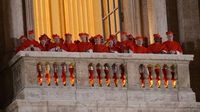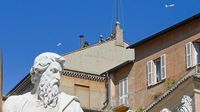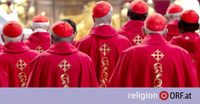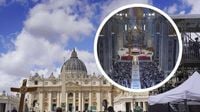On Wednesday, May 7, 2025, the Catholic Church will witness a pivotal moment as 133 eligible cardinals gather in the Vatican to elect a new Pope following the death of Pope Francis. The conclave, which will unfold in the historic Sistine Chapel, is expected to be the largest in history, marking a significant event for the estimated 1.4 billion Catholics worldwide.
The day's proceedings will begin at 10:00 AM with the Mass "Pro Eligendo Romano Pontefice" in St. Peter's Basilica, led by Giovanni Battista Re, who presided over Pope Francis's funeral. This solemn service sets the tone for the conclave, emphasizing the spiritual nature of the election. After the Mass, the cardinals will proceed to the Cappella Paolina in the Apostolic Palace at 4:15 PM before entering the Sistine Chapel at 4:30 PM, where the actual voting will take place.
As the cardinals prepare for the election, the atmosphere is charged with anticipation. Cardinal Pietro Parolin, the Vatican's Secretary of State, is widely regarded as a leading candidate, alongside other prominent figures such as Pierbattista Pizzaballa and Matteo Maria Zuppi. Parolin's candidacy has garnered significant attention, with reports suggesting he could secure around 40 votes, but he will need at least 89 votes for the required two-thirds majority to be elected.
The conclave's voting process is shrouded in secrecy, with the cardinals taking an oath to maintain confidentiality about the proceedings. They will cast their votes by writing the name of their chosen candidate on a ballot, which they will then place in a designated urn. If the voting rounds yield no clear majority, black smoke will rise from the chimney of the Sistine Chapel, indicating that no Pope has been elected. Conversely, white smoke signifies a successful election.
In a significant departure from past practices, the Vatican will shut down all telecommunications and mobile networks within its territory to ensure the cardinals remain isolated from external influences during the conclave. This measure, effective from 3:00 PM on May 7, aims to uphold the integrity and confidentiality of the election process.
The election process, as defined by Pope John Paul II in 1996, allows for a maximum of 120 eligible cardinals. However, Pope Francis increased this number, leading to the unprecedented situation where 133 cardinals will participate in the election. This is the highest number of voting cardinals in history, reflecting the growing global representation within the Church.
Cardinal Vinko Puljic, initially absent due to health concerns, will also be present but cannot enter the Sistine Chapel. In such cases, three designated cardinals will collect his ballot, ensuring that every eligible vote is accounted for.
During the conclave, the cardinals will reside in the Santa Marta guesthouse, cut off from all external communications. They will participate in a series of ballots, with two scheduled in the morning and two in the afternoon, until a new Pope is elected or a decision is made to pause for reflection. If no consensus is reached by the 13th ballot, the election will be interrupted for a day of prayer.
The significance of this conclave extends beyond the election of a new Pope; it symbolizes the Church's response to contemporary challenges. With ongoing discussions about reform, particularly regarding the handling of sexual abuse cases and the Church's stance on various social issues, the new Pope will be expected to be a "bridge builder," fostering unity and dialogue within the global Catholic community.
As the world watches, the first smoke signals from the Sistine Chapel will be closely monitored, with the hope that white smoke will signal the election of a new Pope. The cardinals' deliberations and decisions will not only shape the future of the Catholic Church but will also resonate with millions of believers around the globe.
With the conclave set to begin, the anticipation is palpable. Who will emerge as the new leader of the Catholic Church? Will it be the experienced diplomat Pietro Parolin, or another candidate who captures the hearts and minds of the electors? As the clock ticks down to the pivotal moment, all eyes are on the Vatican, where history is about to unfold.




